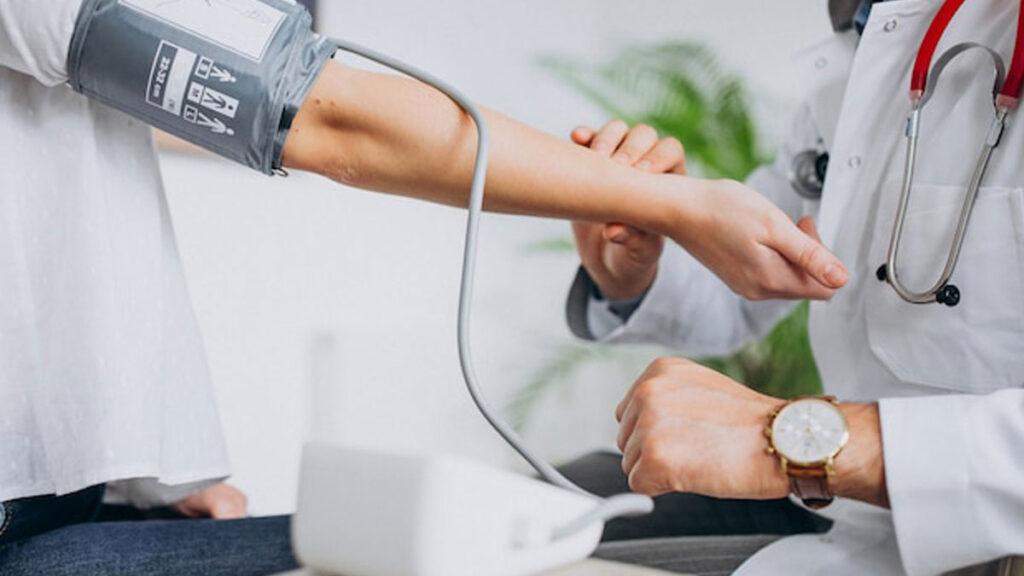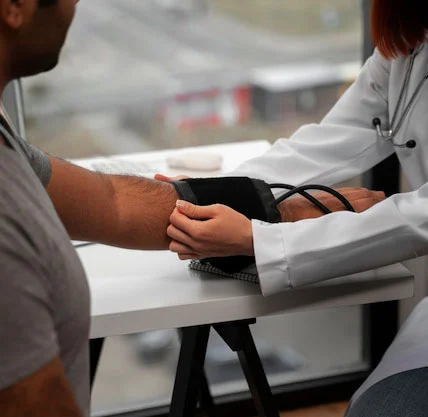
High Blood Pressure: A Comprehensive Guide
When was the last time you got your blood pressure checked? Many people think, “I feel fine, why should I care about my BP?” Well, High blood pressure, or hypertension, is a stealthy condition that often goes unnoticed until it caused significant health issues. Unfortunately, there are few obvious high blood pressure symptoms, and that’s what makes it so dangerous.
Table of Contents
ToggleWhat Is High Blood Pressure?
Blood pressure is a measure of the force that your blood exerts against the walls of your arteries as it flows through your body. A normal blood pressure reading is typically defined as 120/80 mmHg or lower. The top number (120) is your systolic pressure, which measures the force against your artery walls when your heart beats. The bottom number (80) is your diastolic pressure, which measures the force against your artery walls between beats when your heart is at rest.
High blood pressure is defined as a consistent systolic reading over 130 mmHg or a diastolic reading over 80 mmHg. When these numbers start creeping up, it means your heart is working harder than it should to pump blood throughout your body.
High blood pressure often goes unnoticed in its early stages, which is precisely why it can silently inflict harm on various organs, potentially leading to the development of various diseases.
If you have any health-related concerns, it is advisable to schedule an appointment at Hale Clinics, renowned as one of the best General Physician Clinics in Mohali.

Causes of High Blood Pressure
Primary hypertension has no identifiable cause. However, several factors can increase your risk, such as:
- Family history
- Obesity
- Sedentary lifestyle
- Excessive alcohol consumption
- Smoking
- Stress
- Aging
- Diet high in salt, fat, and cholesterol
Secondary hypertension is caused due to following:
- Kidney disease
- Adrenal gland disorders
- Thyroid problems
- Sleep apnea
- Certain medications
- Illegal drugs like cocaine and methamphetamines
No matter the cause, high blood pressure forces your heart to work harder to pump blood through your arteries. Over time, this increased pressure can damage the lining of your arteries and lead to atherosclerosis (hardening of the arteries). It also puts extra strain on your heart muscle, which can eventually lead to heart failure.
Conclusion
High blood pressure may be silent, but it’s also deadly if left unchecked. By taking control of your heart health today, you can significantly improve your odds of living a longer, healthier life. Schedule a blood pressure check at your next doctor’s visit and take that vital first step.
FAQs
Q1. What is considered high blood pressure?
Ans. High blood pressure is defined as a consistent systolic reading over 130 mmHg or a diastolic reading over 80 mmHg.
Q2. What are the main causes of high blood pressure?
Ans. Primary causes include family history, obesity, sedentary lifestyle, excessive alcohol, smoking, stress, aging, and a diet high in salt, fat, and cholesterol.
Q3. Why is high blood pressure dangerous if there are no symptoms?
Ans. High blood pressure often goes unnoticed until it causes significant health issues. Over time, the increased pressure can damage artery linings leading to atherosclerosis and put extra strain on the heart muscle potentially causing heart failure.
Q4. How can I check if I have high blood pressure?
Ans. Get your blood pressure checked regularly at doctor visits. There are often no obvious symptoms of high blood pressure, so medical screening is important.
Q5. What are the best ways to help prevent or manage high blood pressure?
Ans. Maintain a healthy weight, get regular exercise, limit alcohol, quit smoking, manage stress, eat a diet low in salt/fat/cholesterol, and follow your doctor’s treatment plan if diagnosed with hypertension.
